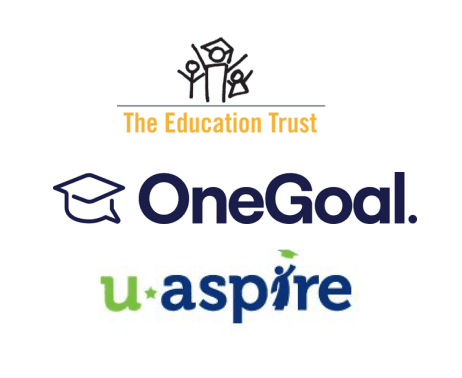Education Advocates Call on Legislators to Invest in Higher Education – The Education Trust
Education Advocates Call on Legislators to Invest in Higher Education The Education Trust


Advocates Testify in Support of Debt-Free Public Higher Education in Massachusetts

On Monday, advocates from OneGoal, uAspire, and The Education Trust in Massachusetts testified at a Joint Committee on Higher Education hearing in support of HB1265/SB823 – An Act relative to debt-free public higher education. If passed, this bill would establish higher education as a right for all students in Massachusetts, including undocumented students, and create a grant program to pay tuition and fees to eligible students at Massachusetts public colleges and universities or certificate, vocation, or training programs at a public college or university.
Sustainable Development Goals (SDGs) Emphasized:
- Goal 4: Quality Education
- Goal 10: Reduced Inequalities
- Goal 16: Peace, Justice, and Strong Institutions
“A college degree can be a ticket to achieving social and economic mobility, not just for individual students, but entire families for generations, yet the cost of public higher education in our state has increased by 59% since 2000 and household incomes are not keeping pace. As a result, one of the biggest concerns for students from low-income backgrounds, students of color, and first-generation college-goers is the rising cost of college and how to pay for it,” said Genesis Carela, senior policy associate for The Education Trust in Massachusetts.
The combination of Question 1 funding, the comprehensive research and follow-up work done as part of the Board of Higher Education’s Strategic Financial Review, and a unique alignment across the House, the Senate, and the executive branch regarding the importance of addressing higher education access and affordability issues give us as good an opportunity as we have ever had to change the narrative about what is possible for every student and family across the Commonwealth. “The time is now to level the playing field. We must all unite to support policies that provide adequate and equitable funding to public colleges so all students can compete in today’s knowledge-based economy and realize their full potential,” said Amanda Seider, executive director of OneGoal — Massachusetts.
This hearing comes as The Education Trust in Massachusetts recently released – in collaboration with their partners in the Massachusetts Education Equity Partnership (MEEP) – a collection of resources for families, students, and advocates to support equitable access to an affordable, high-quality postsecondary education at Massachusetts public colleges and universities. The resources include:
- A data hub to explore affordability indicators at public two and four-year institutions in the Commonwealth
- A toolkit that offers actionable steps that advocates can take to encourage conversations about debt-free higher education and drive meaningful policy changes
The toolkit is available in English and Spanish.
“Students, families, and community members deserve access to clear and transparent information about the cost of attaining a postsecondary degree or credential,” said Femi Stoltz, Massachusetts policy director of uAspire. “We’re proud to partner with the Massachusetts Education Equity Partnership to offer a comprehensive resource that will put this critical information into their hands as they consider their postsecondary options. We’re excited that the data and guidance in this tool will help students and families make informed decisions, advocate for resources, and push for solutions that will increase affordability for all.”
For more information:
- Visit https://masseduequity.org/allin4adebtfreefuture/ for more information about “All In For A Debt-Free Future”
- Learn how to put the toolkit into action
- Sign up to receive updates from The Massachusetts Education Equity Partnership
SDGs, Targets, and Indicators in the Article
1. Which SDGs are addressed or connected to the issues highlighted in the article?
- SDG 4: Quality Education
- SDG 10: Reduced Inequalities
The article discusses the rising cost of public higher education and the need for equitable access to affordable education. These issues are directly connected to SDG 4, which aims to ensure inclusive and equitable quality education for all. Additionally, the article highlights the concerns of students from low-income backgrounds, students of color, and first-generation college-goers, indicating a focus on reducing inequalities (SDG 10) in access to higher education.
2. What specific targets under those SDGs can be identified based on the article’s content?
- SDG 4.3: By 2030, ensure equal access for all women and men to affordable and quality technical, vocational, and tertiary education, including university.
- SDG 10.2: By 2030, empower and promote the social, economic, and political inclusion of all, irrespective of age, sex, disability, race, ethnicity, origin, religion, or economic or other status.
The article highlights the need for affordable higher education for all students in Massachusetts, including undocumented students. This aligns with SDG 4.3, which focuses on equal access to affordable and quality tertiary education. Additionally, the article emphasizes the importance of addressing higher education access and affordability issues for students from low-income backgrounds, students of color, and first-generation college-goers. This relates to SDG 10.2, which aims to promote social and economic inclusion for all individuals.
3. Are there any indicators mentioned or implied in the article that can be used to measure progress towards the identified targets?
- Cost of public higher education in Massachusetts
- Household incomes
- Affordability indicators at public two and four-year institutions in Massachusetts
The article mentions the rising cost of public higher education in Massachusetts since 2000 and the concern of students regarding the affordability of college. These indicators can be used to measure progress towards SDG 4.3, as they reflect the accessibility and affordability of tertiary education. Additionally, the article highlights the need for clear and transparent information about the cost of attaining a postsecondary degree or credential. This indicates the importance of affordability indicators at public institutions, which can be used to measure progress towards SDG 4.3.
Table: SDGs, Targets, and Indicators
| SDGs | Targets | Indicators |
|---|---|---|
| SDG 4: Quality Education | 4.3: By 2030, ensure equal access for all women and men to affordable and quality technical, vocational, and tertiary education, including university. | – Cost of public higher education in Massachusetts – Affordability indicators at public two and four-year institutions in Massachusetts |
| SDG 10: Reduced Inequalities | 10.2: By 2030, empower and promote the social, economic, and political inclusion of all, irrespective of age, sex, disability, race, ethnicity, origin, religion, or economic or other status. | – Cost of public higher education in Massachusetts – Household incomes |
Behold! This splendid article springs forth from the wellspring of knowledge, shaped by a wondrous proprietary AI technology that delved into a vast ocean of data, illuminating the path towards the Sustainable Development Goals. Remember that all rights are reserved by SDG Investors LLC, empowering us to champion progress together.
Source: edtrust.org

Join us, as fellow seekers of change, on a transformative journey at https://sdgtalks.ai/welcome, where you can become a member and actively contribute to shaping a brighter future.







